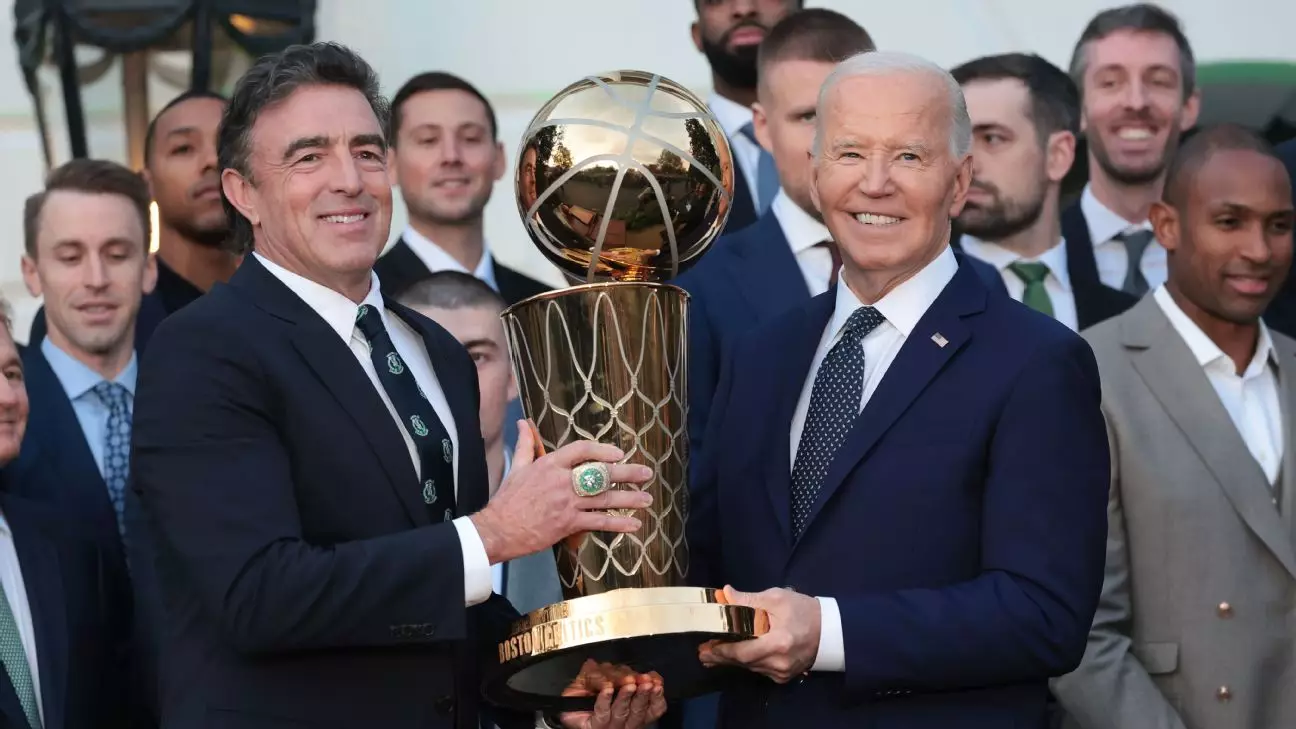The Boston Celtics, one of the most storied franchises in NBA history, is currently navigating a transitional phase under their owner, Wyc Grousbeck. The team recently celebrated their record-setting 18th NBA championship at the White House, where Grousbeck detailed his ongoing commitment to the franchise amidst the backdrop of an impending sale of their controlling stake. This article will explore Grousbeck’s assertions about the Celtics’ potential for future success, the significant changes in ownership, and the broader implications for the franchise and its fans.
Wyc Grousbeck has been at the helm of the Boston Celtics since 2002, and during a recent press conference, he expressed a strong belief in the team’s ability to contend for more championships in the short term. With plans to remain in charge for at least the next three years, Grousbeck aims to stabilize the team during a critical transition in management. He stated his excitement about the potential for repeating their championship success in the current season, emphasizing that the team’s capacity to compete is what drives him at this juncture.
Despite the anticipated transition, Grousbeck assured fans that the spirit of the team remains intact. “I think we’re contenders this year, and we can be contenders in the future,” he noted, indicating that his focus is not only on maintaining the present success but also on building a legacy for the years to come. This proactive stance aligns with the sentiments of fans and analysts alike, who recognize the Celtics as noteworthy contenders in the league.
The recent announcement regarding the sale of the Celtics’ controlling stake emerged as a shock to many, particularly in light of the franchise’s history of stable ownership. The sale represents a paradigm shift that could significantly affect the team’s trajectory moving forward. Currently, Boston Basketball Partners, L.L.C., holds the reins but plans to finalize a majority interest sale by 2024 or early 2025, with future ownership dynamics still in play until 2028.
Such ownership transitions can herald both uncertainty and opportunity. While Grousbeck’s commitment to staying connected to the franchise offers a degree of continuity, the ultimate new owners will play a pivotal role in shaping the team’s culture, strategic direction, and overall success. The decision to sell comes during a prosperous period for the Celtics, which could make the franchise a more attractive proposition for potential buyers, thus potentially accelerating the sale process.
The recent championship celebration at the White House added a layer of historical significance to the Celtics’ achievements. The event, graced by Massachusetts political figures and President Biden, reflected both a regional pride and a national recognition of the Celtics’ contributions to the sport. For many team members, including players who have never celebrated an NBA title before, the White House visit marked an exhilarating milestone.
Guard Derrick White articulated the awe shared by many when he stepped into the Oval Office, stating, “I was like, ‘I’m a little bit more excited than I thought I was going to be.'” Such sentiments highlight the gravity of the event not just as a personal achievement, but as a representation of the franchise’s esteemed legacy. This blend of joy and responsibility is a testament to the weight of the Celtics’ history and its impact on both players and fans alike.
Navigating a franchise through the complexities of ownership changes while simultaneously striving for championship success demands astute leadership. Grousbeck’s remarks throughout this transitional phase indicate a solid understanding of the intricate balance required to maintain team morale and engagement.
Coach Joe Mazzulla, for instance, has fostered a workmanlike ethos that prioritizes progress over nostalgia. His philosophy encourages players to focus on present challenges rather than bask in the glow of past victories. This creates a productive culture aimed at continual improvement, a necessary component for any franchise aspiring to replicate its success over multiple seasons.
The presence of historical context, coupled with clear leadership and strategic vision, places the Boston Celtics at a pivotal junction. The decisions made in the upcoming months will likely reverberate within the franchise for years to come, shaping its identity and legacy.
As the Boston Celtics embark on this new chapter under Wyc Grousbeck’s steady stewardship amid potential ownership changes, their aspirations for continued championship success remain strong. The recent White House celebration served as a reminder of the team’s rich history and its impact on both local and national levels. Challenges lie ahead, but with a committed leadership team and a talented roster, the Celtics have the tools necessary not only to compete, but to thrive in the evolving landscape of the NBA.

